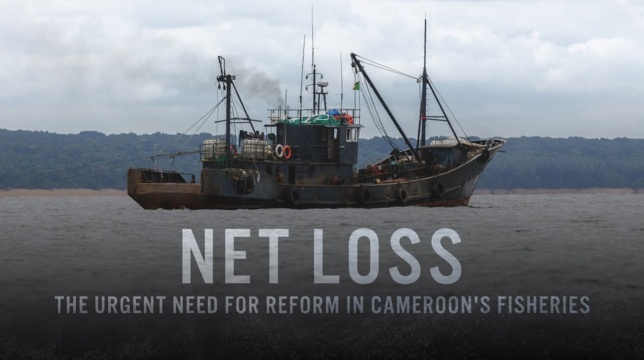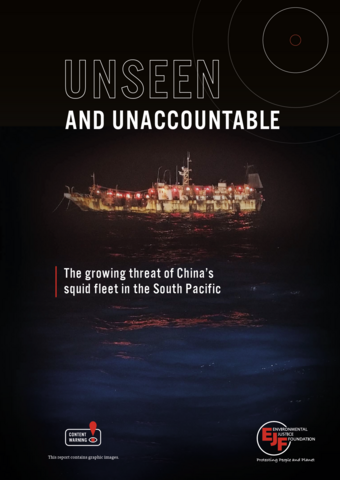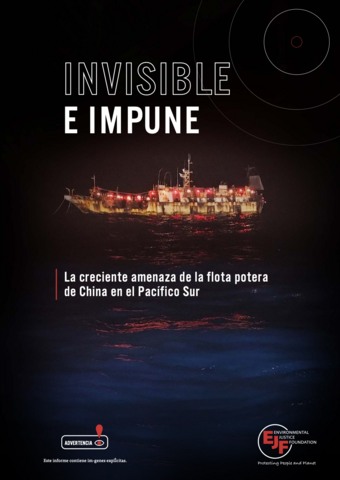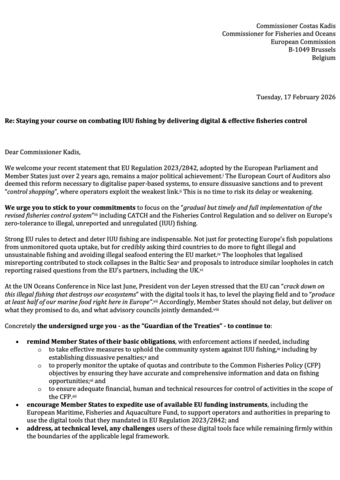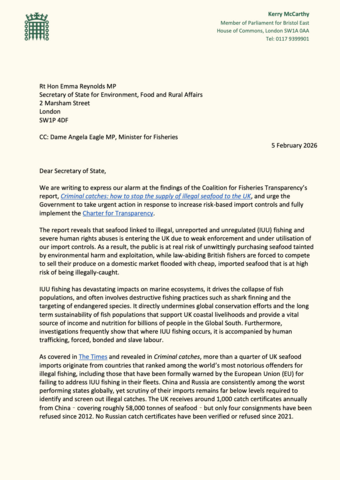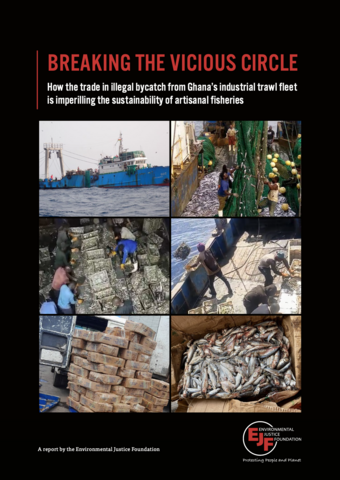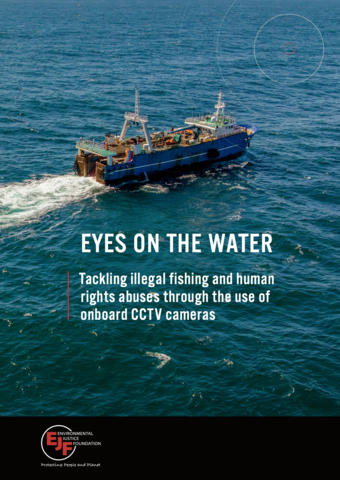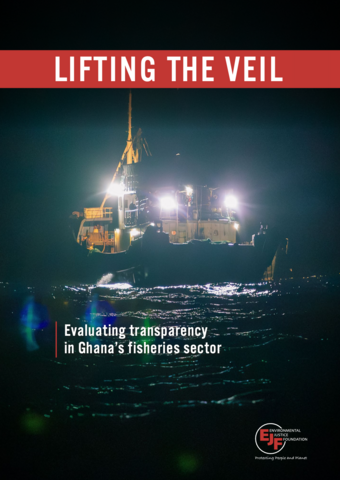Films
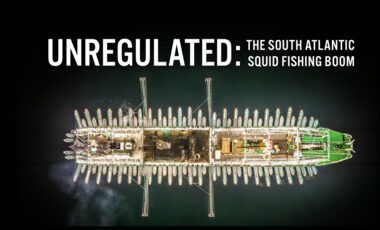
Unregulated: The South Atlantic Squid Fishing Boom
Hundreds of distant-water vessels are plundering squid populations in the Southwest Atlantic, driving a keystone species towards collapse and exposing workers to horrific abuses, according to a new investigation and film from the Environmental Justice Foundation (EJF).
Unregulated: The South Atlantic Squid Fishing Boom
Hundreds of distant-water vessels are plundering squid populations in the Southwest Atlantic, driving a keystone species towards collapse and exposing workers to horrific abuses, according to a new investigation and film from the Environmental Justice Foundation (EJF).
Discarded: Hidden Overfishing in the EU
In European waters, fish are caught and dumped at sea to make room for more valuable catch. This practice, known as highgrading, is illegal, but unfortunately most cases go unreported.
This extremely wasteful and unsustainable practice puts pressure on struggling ecosystems and harms honest fishers’ livelihoods. Transparency is the key to protecting these ecosystems and ending this widespread illegal practice.
The High Seas: A Global Deal to Protect Our Oceans
The UN High Seas Treaty has entered into force, and we celebrate this exciting moment for ocean protection. It is evidence that a rules-based order can still deliver in the face of escalating environmental breakdown.

Sebelum Anda Naik Kapal: Risiko Tersembunyi dari Kapal Penangkap Ikan Jarak Jauh
15th December, 2025Sebelum Anda Naik Kapal: Risiko Tersembunyi dari Kapal Penangkap Ikan Jarak Jauh
Before You Board: The Hidden Risks of Distant Water Fishing
Every year, thousands of Indonesians work as fishers on foreign boats, promised high wages for work abroad. However, the reality of life at sea can be very different from what is promised. Once onboard, fishers are routinely overworked, abused, and exploited.
Are you thinking of taking a job on a distant water fishing vessel? Watch out for these warning signs:
🚩 The recruitment agency doesn't have a valid licence or has a bad reputation. A company's SIUKAK/SIUPPAK permit can be found on the official Ministry of Transportation website, while its SIP3MI permit can be checked on the Ministry of KP2MI website.
🚩 The recruitment agency offers loans
Loans through banks or cash advances from companies are often used to pressure crew into accepting low salaries or prevent them from terminating their employment contracts.
🚩 Lack of transparency about salary
The recruitment agency receives crew's salary in advance before transferring it to their personal account. This creates an opportunity for companies to illegally "take a share" of crew's salary.
🚩 Retention of identity documents
Confiscation of passports, ID cards, family cards, and other personal documents controls migrant workers' movements while working.
🚩 Offered work on Chinese-flagged ships
Several human rights organisations have documented various human rights violations and allegations of forced labor against Indonesian migrant workers on Chinese-flagged ships.
(The footage used is illustrative and does not necessarily show the boats discussed by the fishers.)
The Forests of Life: How Mangroves Sustain Ghana's Fisheries, Coastline, and Climate – an EJF film
Mangroves sustain communities, shield coasts, and store vast amounts of carbon. In Ghana they are vanishing fast – but their protection is within reach through safeguarding, restoration, and community leadership.
In partnership with Hen Mpoano, watch our short documentary, which reveals how local action and stronger policy can revive these vital ecosystems.
Together we are strong: Liberia's fishmongers building fairer fisheries
Communities for Fisheries: The lasting impact – an EJF film
Net loss: the urgent need for reform in Cameroon's fisheries
This film lays bare the impacts of illegal fishing on Cameroonian coastal communities, highlighting widespread lawbreaking, human rights abuses, and the urgent need for fisheries transparency.
Reports
Unseen and unaccountable: The growing threat of China’s squid fleet in the South Pacific
This report exposes the alarming environmental and human rights toll of China’s distant-water squid fleet in the Southeast Pacific. It draws on investigations that reveal widespread shark finning, marine mammal capture, abusive labour practices, and the unloading of deceased crew into Latin American ports. The report also highlights major governance failures: despite early warnings of a decline in the squid population, and calls for urgent reforms to end IUU fishing and forced labour in the world’s most important squid fishery. Watch the webinar where we discuss the findings of this report with experts: https://www.youtube.com/watch?v=4r0CjrHha2E
Invisible e impune: La creciente amenaza de la flota calamarera de China en el Pacífico Sur: El informe denuncia el alarmante impacto medioambiental y los abusos de derechos humanos asociados a la flota china de pesca de calamar en alta mar en el Pacífico Sudoriental. El informe recoge investigaciones que revelan prácticas generalizadas de cercenamiento de aletas de tiburones, captura incidental de mamíferos marinos, abusos laborales y el desembarco de tripulantes fallecidos en puertos latinoamericanos. También destaca graves fallos de gobernanza en la pesquería de calamar más importante del mundo. Vea el seminario web en el que debatimos las conclusiones de este informe con expertos: https://www.youtube.com/watch?v=4r0CjrHha2E
Letter to Commissioner Kadis: Staying your course on combating IUU fishing by delivering digital and dissuasive fisheries control: This letter urges European Commissioner for Fisheries and Oceans Costas Kadis to stick to his commitments to focus on the “gradual but timely and full implementation of the revised fisheries control system”, which includes CATCH and the Fisheries Control Regulation, to deliver on Europe’s zero-tolerance to illegal, unreported and unregulated fishing.
Parliamentary letter on UK's seafood imports: In this letter to Emma Reynolds MP (Secretary of State at the Department of Environment, Food and Rural Affairs) and Dame Angela Eagle MP (Minister for Fisheries), over 40 parliamentarians express their alarm at the ongoing failure to adequately scrutinise the UK’s seafood imports and the risk this poses to consumers, fishers and the marine environment. They urge the environment and fisheries ministers to take action to strengthen the UK’s import control system, to prevent the country from becoming a dumping ground for illegal and slave-caught seafood.
Breaking the vicious circle: How the trade in illegal bycatch from Ghana’s industrial trawl fleet is imperilling the sustainability of artisanal fisheries: Populations of small pelagic fish traditionally caught by artisanal fishers in Ghanaian waters are severely overfished and in a state of collapse. The alarming state of Ghana’s small pelagic fisheries results in part from persistent illegal, unreported and unregulated fishing by the largely foreign-owned industrial trawl fleet. The use of illegal fishing gear by trawlers results in large volumes of bycatch, known locally as logo fish - juvenile and undersized fish which are either discarded or sold to coastal communities for profit. Urgent action is needed to break this vicious circle and ensure a more sustainable and equitable future for Ghana’s fisheries.
Eyes on the water: Tackling illegal fishing and human rights abuses through the use of onboard CCTV cameras: Illegal, unreported and unregulated (IUU) and unsustainable fishing places immense pressure on the world’s oceans. These destructive practices go hand in hand with human rights violations and labour abuses. A major challenge in effectively tackling these issues is that much of this harmful activity occurs in the middle of the ocean, where it is easier to avoid detection. The findings of this report show that the adoption of fleet-wide CCTV, as a key tool within broader monitoring, control and surveillance systems, has massive potential to enhance transparency, tackle IUU fishing, and address human rights abuses at sea.
Lifting the veil: Evaluating transparency in Ghana's fisheries sector: Illegal fishing and overfishing risk the collapse of Ghana’s fish populations, directly undermining the most basic human rights of coastal communities, and costing the country millions of dollars every year. Greater transparency is needed to achieve sustainable, legal, and ethical fisheries. This analysis aims to inform and guide this action, and to assist Ghana in moving from commitment to the Global Charter to full implementation, ensuring that the benefits of transparency are secured for the many Ghanaians who depend on fisheries resources for their livelihoods.






